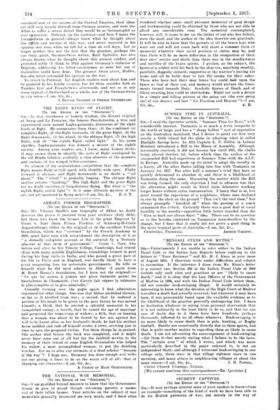"BENGALI CULTS AND MYTHS."
ITO TEE EDITOR or ens "Seocriroa."1 Sta,—Unfortunately I am unable to refer either- to the Indian Penal Code or tile Indian Law Reports before replying to the letters of " Your Reviewer " and Mr. H. J. Moog in your issue of August 18th. I therefore write under difficulties and subject to correction. If the inference I draw from Mr. Knotee letter is a correct one, Section 336 of the Indian Penal Code of 1860 forbids only such rites and practices IP! are " likely to cause death," and it is clear that the Law Officers of the Government of Madras in 1690, and with the Indian l'enal Code before them, did not consider hook-swinging illegal. It would eertainly be interesting to know what the decision of the High Court of Madras was after a death had actually occurred; but whatever it may hove been, it was presumably based upon the available evidence as to the likelihood of the practice generally endangering life. I have no hesitation whatever in saying from peramtel observation that it is not ordinarily in the least likely to do so, and that for one case of death. due to it there have been hundreds, perhaps thousands, followed by no ill effects whatever. Hook-swinging is no more likely to cause death than is polo, hunting, or Rogity football. Deaths are occasionally directly due to these sports. but that is quite another matter to regarding them as likely to cause death. I am not advocating the encouragement of hook-swinging —far from it—but merely stating what I believe to be the facto. The "certain area" of which I wrote, and which was more particularly described in the paper referred to, is not an independent State; and although I witnessed hook-swinging in one village only, there were in that village eighteen cases in one morning, and many others in neighbouring villages at about the
same season.—I am, Sir, de., J. H. Pownn. Christ Church Fkarage, Nailsea.
[We cannot continua this correspondence.—Em .Spectator.]


































 Previous page
Previous page